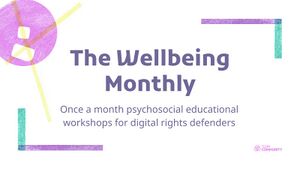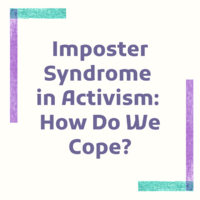Imposter Syndrome in Activism: How Do We Cope?: Difference between revisions
No edit summary |
|||
| Line 5: | Line 5: | ||
*'''Language:''' English | *'''Language:''' English | ||
*'''Location:''' Zoom | *'''Location:''' Zoom | ||
👉🏽 '''RSVP:''' [https://digitalrights.formstack.com/forms/ | 👉🏽 '''RSVP:''' [https://digitalrights.formstack.com/forms/wellbeingmonthly4 https://digitalrights.formstack.com/forms/wellbeingmonthly4] | ||
=== Imposter Syndrome in Activism: How Do We Cope? === | === Imposter Syndrome in Activism: How Do We Cope? === | ||
Revision as of 12:56, 2 October 2023
This session is part of The Wellbeing Monthly 2023, a monthly virtual workshop will be led by diverse mental health professionals, and will focus on psychoeducation and coping mechanisms on diverse topics including anxiety and fear, guilt and survivors guilt, defeat and hopelessness, trauma, and burnout and stress.
- Who: Khumo Masege
- Date: Tuesday, October 3
- Time: 9am EDT / 1pm UTC (What time is it in my city?)
- Language: English
- Location: Zoom
👉🏽 RSVP: https://digitalrights.formstack.com/forms/wellbeingmonthly4
Imposter Syndrome in Activism: How Do We Cope?
This workshop will briefly explore the systems that impact and perpetuate the experience of imposter syndrome in marginalized communities and activist spaces. We will build an understanding of what Imposter Syndrome looks like within the context of activism and build an understanding of its impacts and symptomatology before working through Skills for coping with, identifying and navigating when this shows up.
Participants will learn:
- What is Imposter Syndrome
- How does Imposter Syndrome Show up in Activism
- Impacts of Imposter Syndrome on self & activism work
- First Aid for navigating these effects
Presenter: Khumo Masege is a New York licensed psychotherapist, certified sexual health educator and Diversity/Equity Consultant based in Johannesburg, South Africa. Her background focuses on intersectional, anti-oppressive and social justice aligned therapy, and education. Her approach to healing is rooted in acknowledging the impacts of systemic oppression and its effects on marginalized BIPOC & Queer peoples mental and sexual health. Khumo’s lived experience both as a Nonimmigrant in the U.S for a decade and as a native to South Africa inform her perspectives around trauma, activism, wellness and the liberation of the global majority.

